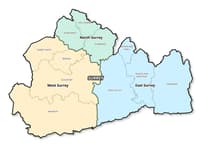All staff at Woking Borough Council will go through redundancy consultations before the year is out.
The timeline for the job losses was spelled out in the bankrupt borough’s newly-published recovery and improvement plan.
The council has around 350 members of staff, many of whom work on the front line, and so far only a small number have been put at risk of redundancy.
Future redundancies are still being discussed with senior managers, some of whom are at risk themselves.
All remaining staff have been told they will undergo consultation in autumn.
The published programme, released ahead of next week’s now-monthly extraordinary overview and scrutiny meeting, shows staff consultations will come to a close in August with its new, reduced structure announced in January 2024.
“Staff savings” will then come into effect that November and services transferred to partner organisations the following April.
A skeleton crew will be retained to run services at a “minimum viable” level as part of wider changes to the way the council will be run, as it slashes 25 per cent from its budget
Announcing the plan to get out of its £2.6billion forecast debt and its £11million annual budget shortfall was borough leader Councillor Ann-Marie Barker.
She wrote: “My administration is very clear about the huge challenges that face the council due to its legacy of extraordinarily high and disproportionate levels of debt and the past financial practices.
“However uncomfortable the future will be, we are focused on delivering this plan, which we know is necessary to achieve financial stability and secure services for the future.
“I am in no doubt that it will take a significant collective effort from councillors and officers to address these challenges and achieve a sustainable position.
“There will be substantial change over the next five years to the services council delivers to residents as it becomes a smaller, leaner council focused on delivering core services to residents.
“Nonetheless, we will not lose our ambition, values and commitment to residents. We are committed to becoming a council that lives within its means.”
Government-appointed commissioners were brought in to chaperone strategic and financial decisions in May – initially for five years but the council is now hopeful it can turn the ship around in three.
The improvement and recovery plan is required as part of the Department for Levelling Up, Housing and Communities intervention at Woking. It spells out the direction of travel the council is taking.
The council has also set up a Financial Control Panel that meets twice a week to review all spending.
A consultant has also been taken on to prepare the 30-year Housing Revenue Account business plan with a initial focus on recharges and rent collection.
Its debt reduction plan is still being developed.
The borough’s chief executive Julie Fisher wrote: “The plan details the actions we will undertake, together with milestones and delivery targets against which to measure performance, to deliver rapid and sustainable improvements in governance, finance and commercial functions, and organisational effectiveness.
“With the support of the commissioners, councillors and partners, I am confident we will deliver the change needed and achieve best value for taxpayers.”
The council’s finances hit the rocks in March because, the report said,“historical, commercial and regeneration investments leading to unsustainable levels of borrowing” as well as a lack of payments set aside to repay its ever-growing debt.
Its downfall was further compounded by Covid, the energy crisis and historically-high inflation – as well as a downturn in income from parking and commercial rents.
The recovery plan says this left the council in a position where it must “significantly reconfigure services” and cut its budget by a quarter.
The plan says it will look at whether to offload or downsize some of the 24 private companies the council owns, “particularly Victoria Square Woking Ltd and Thameswey” as part of four key bedrocks; finance, commerce, governance and reorganisation.
The plan, however, is still short on specifics but can be boiled down to making the council as small as possible, improving the remaining functions and running a balanced budget.
The council described it as “fixing the plumbing”, making significant savings and efficiencies, before operating “effectively as a smaller organisation with strengthened financial and legal capability and capacity” and then manage its “finances with sustainable budgets”.
Any assets left will need to “generate greater yields”.
The report reads: “The council will be a smaller organisation focused on essential services.
“Discretionary service areas must have a strong rationale for being delivered by Woking Borough Council and need to be cost neutral.
“This will mean fees and charges may need to be increased if it allows the service to continue.”

.jpeg?width=209&height=140&crop=209:145,smart&quality=75)
.jpeg?width=209&height=140&crop=209:145,smart&quality=75)


Comments
This article has no comments yet. Be the first to leave a comment.